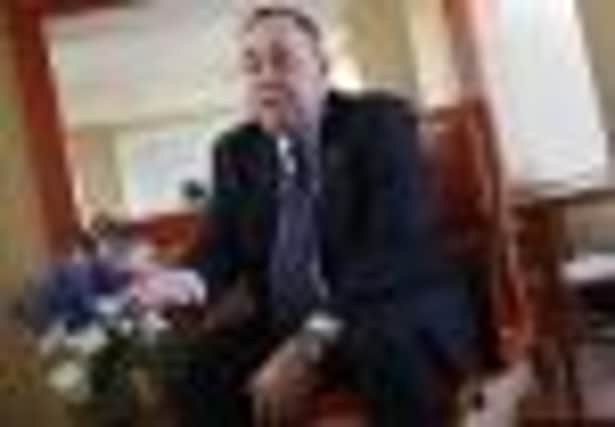Scottish independence: SNP open to US military bases


The First Minister said the SNP had held talks with US representatives about entry to Nato for an independent Scotland.
On a visit to New York for the Tartan Day celebrations, he defended his party’s switch in policy to back an independent Scotland remaining in Nato. “The choice in policy terms is to be a non-nuclear member of that organisation,” he said, before indicating that an independent Scotland could host US Nato bases. “So then, if we are talking about a non-nuclear base, then of course that would be something that would be possible in terms of the [Nato] treaty agreement.”
Advertisement
Hide AdAdvertisement
Hide AdMr Salmond added neither he nor Washington had broached the subject of a US military base in Scotland, but the SNP had had discussions with American representatives about Nato membership.
And at an event last night, he said: “We took the decision [on Nato membership] because we knew it was a signal to our friends and partners that we recognised their legitimate interest in the process of Scottish independence.
“We wanted to send a signal to our friends and partners that we wanted to assume responsibility as a responsible friend and partner.”
However, when asked when the talks between the US and Scotland had taken place, who they were with and what had been discussed, the First Minister’s spokesman refused to give any further information.
He said: “We have a wide range of discussions with our international friends and partners on an independent Scotland’s place in the world, and we look forward to further such talks in the run-up to the referendum. As is normal in international affairs, some of these discussions are private.”
When asked under Freedom of Information (FoI) legislation for details of any correspondence or meetings that the SNP administration had had with Nato since 2011, officials said no such information was held.
The failure to produce records came despite demands from SNP politicians for the party leadership to secure a guarantee from Nato that it would accept a nuclear-free, independent Scotland as a member.
The lack of detail also concerned opposition politicians.
Shadow Defence Secretary Jim Murphy said: “Most people will be puzzled why the SNP want to be part of the Nato alliance but want out of our most important alliance, of the United Kingdom.
Advertisement
Hide AdAdvertisement
Hide Ad“Claiming to have secret talks with the Americans while keeping defence plans secret from the Scottish people is no way for the SNP to behave.
“The SNP defence policy is a muddle and a mess. On all the big defence issues, including the size of forces and defence jobs in Scotland, people want answers not more posturing from the SNP. Recent revelations show that they haven’t even officially approached Nato.”
The absence of Scottish Government records referring to Nato came to light through an FoI request that asked if “ministers, advisers or civil servants” had had meetings or correspondence with Nato since 2011. It asked the same about relations with Denmark, Norway and Sweden, three countries the SNP says are key to a defence strategy in an independent Scotland.
Scottish Liberal Democrat leader Willie Rennie called on the SNP government to be more open about its defence plans.
He said: “It is no good the SNP saying they are having private discussions. We need agreements that are transparent and we must ensure people understand how Scotland may lose out if Scotland went independent.
“The SNP asserts that there will be a smooth entry into Nato with no problems over the Trident issue. But the public deserves to see evidence that this would be the case.”
As the controversy raged at home, Mr Salmond continued his US trip, which has been described by critics as a £360,000, taxpayer-funded jaunt to bang the drum for independence.
Addressing an audience at the Carnegie Council for Ethics in International Affairs, a New York-based group set up in memory of Scottish philanthropist Andrew Carnegie, he said: “Both the Declaration of Arbroath, with its search for a Scottish legitimacy, and the Declaration of Independence, with its affirmation of popular sovereignty, were sealed in the force of arms and struggle.
Advertisement
Hide AdAdvertisement
Hide Ad“Now the process of Scottish self-determination is signed in a handshake and determined in a democratic referendum of the people.
“Even in modern times, this is a rare and precious process and one which stands as an exemplar to the rest of the world.”